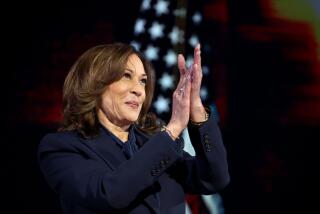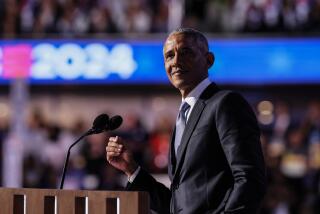President Obama: ‘It’s not like I’ve changed’ since entering politics

President Barack Obama speaks about partisanship and race Feb. 10, 2016, with colleagues from his time in the Illinois Senate. (Brian Nguyen and Chris Walker/Chicago Tribune)
President Obama was addressing the Illinois General Assembly, but the dogged Statehouse press corps was not there.
From the gilded balcony of the cathedral-like House chambers, I phoned an old reporter friend from when we both covered the community organizer turned state senator.
“I didn’t go up to the floor to hear him speak when he was a lawmaker,” said the veteran, who listened to Obama’s speech from the basement press room. “Why would I come up there now?”
As the only White House correspondent who watched Obama launch his political career here in 1997, people ask me all the time: What did people think of him back then? Did he take the place by storm? When did you realize he would be president?
Honestly? Few people knew him. He kept a low profile for most of his eight years. He was just a new lawmaker in the minority party with zero involvement in the hidden machinations of the Capitol.
See more of our top stories on Facebook >>
In conversations Wednesday in his private cabin on Air Force One as he flew to Springfield — a native son returning to his political roots — and then later in a chat with three former legislators, Obama said that while America’s political culture has grown meaner and more partisan, he has not.
“It’s not like I’ve changed,” he said. “I’m the same guy now that I was then.”
He added, “I’m no more cynical. I’m not more ideological. My positions are surprisingly consistent.”
After he first entered the White House in 2009, he said, “I would invite a number of Republican senators… to come over to the White House for movies or some other events.”
But increasingly, he complained, “it was hard for them to do it without getting in trouble” with others in the GOP.
He made clear he missed the anonymity of being a backbencher in a prairie capital, the days when he could drive his beat-up Jeep to the Dairy Queen and, as he joked, build up a college fund for his daughters, Malia and Sasha, by fleecing his colleagues in poker.
“I took them for all they were worth,” he boasted to laughter.
His secret? “I would just nurse my beer and these guys — you know. So the longer the game went on, the looser their betting got,” he claimed.
It was also a time when, his friends agreed, he could bring warring political factions together in backrooms to strike a deal, when he wasn’t lampooned or lionized by people who didn’t know him.
The truth is few in the Statehouse took note of Obama during his years here.
I came to know him, but only because my newspaper, the Chicago Tribune, was devoted to uncovering flaws in the Illinois capital justice system. Obama, a constitutional lawyer who also focused on the problem, was valuable to us.
Still, it took years me to realize he might one day rise in politics — possibly even to mayor of the city of Chicago. And that insight came only after Democrats took the majority in the state Senate and he began to call some shots.
As I traveled and talked with Obama on his return to Springfield, I realized how much his anonymity worked for him then — and how it informed his view that Americans are not as divided as our politics would suggest.
When he sat down with three old friends — former senators who showed him the ropes in Springfield — he talked about all they got done outside the public spotlight.
They fostered friendships, discussed their daughters and looked for common ground. They didn’t become punching bags on cable news or talk radio.
After he got to Washington, he recalled, “I had very good relationships and friendships with some of the same people now who can’t take a picture with me. It wasn’t like I changed.”
I listened as they reminisced about passing state laws to reform campaign finance and capital justice. Obama also won bipartisan support for a bill to make police more aware of the role that race may play in law enforcement.
I suddenly recalled a moment with Obama outside the Statehouse press room, sometime in 2002. I’d accosted him with a tape recorder to ask about his closed-door meetings with law enforcement officials to talk about racial profiling.
He smiled and said he’d let me know when he had something to tell me.
I pressed. A liberal black lawmaker from Chicago? Shouldn’t he want to vent about the system? Especially to his hometown paper?
He dug in. He’d talk to me, I remember him saying, but not then.
I stormed off to talk to somebody else. Someone who was going places.
ALSO
Oregon standoff: Last holdout surrenders
Belief in all-knowing, punitive gods aided the growth of human societies, study says
Scientists detect gravitational waves, space-time ripples that Einstein predicted 100 years ago
More to Read
Sign up for Essential California
The most important California stories and recommendations in your inbox every morning.
You may occasionally receive promotional content from the Los Angeles Times.










